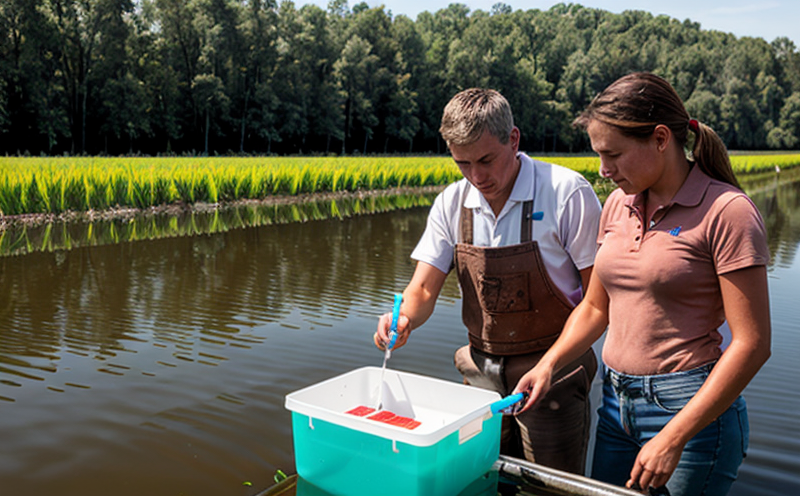Bromide Content Testing in Agricultural Water
The need to monitor bromide content in agricultural water is increasingly important due to its potential impact on crop health and water quality. Bromides can be introduced into irrigation systems through various sources, including natural groundwater and the use of treated wastewater. Excessive levels of bromide ions (Br-) in water can lead to issues such as increased chloride content in crops, which may affect their marketability and nutritional value. This service focuses on providing accurate bromide content testing for agricultural water, ensuring that farmers and irrigation system operators are informed about the quality of the water they use.
The process involves a series of steps to ensure precision and reliability. Initially, samples are collected from various points in the irrigation network or directly from storage tanks. The sample preparation includes filtration and dilution if necessary, followed by analysis using advanced spectroscopic methods such as atomic absorption spectrophotometry (AAS) or ion chromatography.
Once the data is collected, it undergoes rigorous validation against international standards such as ISO 7401:2019. The results are then reported with detailed parameters including detection limits and confidence intervals to ensure transparency for all stakeholders involved in agricultural water management.
This service plays a crucial role not only in maintaining the quality of crops but also in complying with local regulations aimed at protecting both human health and environmental sustainability. By offering this specialized testing, we aim to contribute significantly towards achieving these goals by providing reliable data that can guide informed decision-making processes within agricultural practices.
Industry Applications
Bromide Content Testing in Agricultural Water: This service finds application across several sectors including agriculture, environmental science, and public health. It is particularly useful for monitoring the quality of irrigation water used in crops like vegetables, fruits, and grains.
- Agricultural producers who rely on recycled water sources
- Irrigation system operators managing large-scale operations
- Environmental agencies ensuring compliance with discharge limits
- Regulatory bodies overseeing the safety of agricultural products
| Industry Sector | Sample Source | Main Focus |
|---|---|---|
| Agriculture | Irrigation Water | Crop Health and Marketability |
| Environmental Science | Groundwater and Surface Water | Water Quality Monitoring |
| Public Health | Drinking Water Supplies | Safety and Compliance |
Environmental and Sustainability Contributions
The testing of bromide content in agricultural water contributes significantly to environmental stewardship by ensuring that the quality of irrigation water meets stringent standards set forth by regulatory bodies. By providing precise measurements, this service helps prevent contamination of soil and groundwater, which could otherwise occur due to improper management practices.
Incorporating these tests into regular maintenance protocols allows for early detection of issues before they escalate into larger problems that might be difficult or costly to address later on. Additionally, accurate data from bromide content testing can support sustainable farming initiatives by facilitating the optimization of water usage and reducing waste.
Moreover, this service supports broader efforts towards sustainability through its role in promoting circular economy principles within agriculture. By reusing treated wastewater for irrigation purposes while maintaining high levels of quality control, there is less pressure on fresh water resources, contributing positively to global water conservation goals.
Competitive Advantage and Market Impact
Offering specialized bromide content testing services in agricultural water provides a competitive edge over competitors by ensuring that clients receive top-tier quality assurance. This can translate into enhanced reputation among customers, improved product safety records, and increased customer trust.
For businesses operating within the agriculture sector, having access to reliable data about their water sources enables them to make more informed decisions regarding resource allocation. It also facilitates compliance with increasingly stringent environmental regulations without compromising productivity or yield.
The ability to demonstrate commitment to sustainability through rigorous testing protocols can be a key differentiator in attracting environmentally conscious consumers and investors alike. By positioning themselves as leaders in responsible agricultural practices, companies gain valuable market leverage that can drive long-term growth and profitability.





